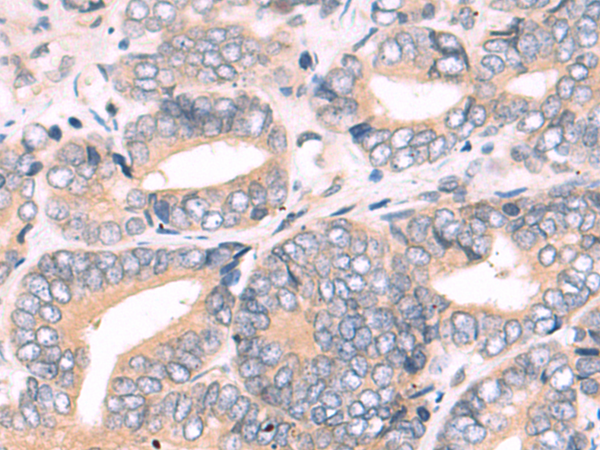
| WB | 咨询技术 | Human,Mouse,Rat |
| IF | 咨询技术 | Human,Mouse,Rat |
| IHC | 1/50-1/200 | Human,Mouse,Rat |
| ICC | 技术咨询 | Human,Mouse,Rat |
| FCM | 咨询技术 | Human,Mouse,Rat |
| Elisa | 1/5000-1/10000 | Human,Mouse,Rat |
| Aliases | IRBP; RBPI; RP66; D10S64; D10S65; D10S66 |
| Host/Isotype | Rabbit IgG |
| Antibody Type | Primary antibody |
| Storage | Store at 4°C short term. Aliquot and store at -20°C long term. Avoid freeze/thaw cycles. |
| Species Reactivity | Human |
| Immunogen | Fusion protein of human RBP3 |
| Formulation | Purified antibody in PBS with 0.05% sodium azide and 50% glycerol. |
+ +
以下是关于RBP3抗体的3篇参考文献及其摘要信息:
---
1. **文献名称**: *Retinol-binding protein 3 (RBP3) in ocular development and disease*
**作者**: Parker RO, Crouch RK
**摘要**: 本文研究了RBP3(视黄醇结合蛋白3)在视网膜中的表达及其在视觉循环中的作用,利用特异性抗体揭示了RBP3在光感受器细胞中的定位,并探讨其与遗传性视网膜病变的潜在关联。
---
2. **文献名称**: *Antibody-based detection of RBP3 in human plasma: implications for age-related macular degeneration*
**作者**: Li B, Vachali PP, Frederick JM, et al.
**摘要**: 研究开发了一种高灵敏度的RBP3抗体检测方法,用于定量人血浆中的RBP3水平,发现其浓度与年龄相关性黄斑变性(AMD)的进展呈负相关,提示其作为疾病生物标志物的潜力。
---
3. **文献名称**: *RBP3 knockout mice exhibit abnormal retinal morphology and function*
**作者**: Ghyselinck NB, Båvik CO, Sapin V, et al.
**摘要**: 通过基因敲除小鼠模型结合RBP3抗体免疫组化分析,证明RBP3缺失导致视网膜结构异常和视黄醇代谢紊乱,强调了RBP3在维持视觉功能中的关键作用。
---
如需更多文献或特定研究方向的扩展,可进一步说明需求。
The retinol-binding protein 3 (RBP3), also known as interphotoreceptor retinoid-binding protein (IRBP), is a glycoprotein primarily expressed in the retina and pineal gland. It plays a critical role in the visual cycle by facilitating the transport of retinoids (vitamin A derivatives) between photoreceptor cells and retinal pigment epithelium (RPE). RBP3 binds all-trans retinol and 11-cis retinal, ensuring efficient recycling of visual chromophores during phototransduction. Its function is vital for maintaining photoreceptor health and light sensitivity.
RBP3 antibodies are widely used in ophthalmic research to study retinal diseases, including retinitis pigmentosa, age-related macular degeneration (AMD), and diabetic retinopathy. These antibodies enable the detection of RBP3 in tissue sections (via immunohistochemistry) or protein extracts (via Western blot), helping to assess retinal integrity or disease progression. Abnormal RBP3 expression has been linked to disrupted retinoid metabolism and photoreceptor degeneration.
Commercially available RBP3 antibodies are typically raised against conserved human or murine epitopes, allowing cross-species reactivity in experimental models. Recent studies also explore RBP3’s potential as a biomarker in ocular fluids for early disease diagnosis. However, its complex structure (∼140 kDa) and post-translational modifications require careful antibody validation to ensure specificity in assays. Ongoing research continues to clarify its role beyond retinoid transport, including immune modulation in the retina.
(Word count: 200)
×